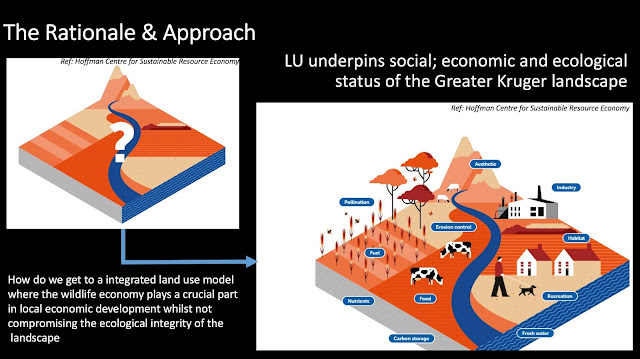GREATER KRUGER STRATEGIC DEVELOPMENT FRAMEWORK: Land Use Expert Group Engagement - Wehncke van der Merwe
 Since its initiation in 2018, the Greater Kruger Strategic Development Framework (GKSDF) has been steaming towards finalisation of the initial concept, planned for early 2020. Through this ambitious initiative, funded by the GEF Protected Area Programme, the aim is to see how the Greater Kruger Conservation Area can contribute to the ecological; economic and social wellbeing of the landscape in which it is nestled. Several thematic Expert Task Teams were formed, of which the Land Use Planning Group was one.
Since its initiation in 2018, the Greater Kruger Strategic Development Framework (GKSDF) has been steaming towards finalisation of the initial concept, planned for early 2020. Through this ambitious initiative, funded by the GEF Protected Area Programme, the aim is to see how the Greater Kruger Conservation Area can contribute to the ecological; economic and social wellbeing of the landscape in which it is nestled. Several thematic Expert Task Teams were formed, of which the Land Use Planning Group was one.
Integrated Land Use Planning underpins the ability of the landscape to achieve socio-ecological wellbeing, and as such a Land Use Expert Group was established to help guide the GKSDF development process. The group had a very successful think tank session on the 17th of September, led by the Buffer Zone Coordinator for Kruger National Park and consultants (Urban-Econ), and attended by various critical role-players in the landscape (including municipalities, provincial government and NGOs). The engagement focussed on ‘where we want to see ourselves in 30 years’. The premise of the importance of land use is that we have to start planning and implementing initiatives now from a land use perspective if we want to create favourable conditions in the future. Developments should strategically happen whilst keeping the larger area in mind. It’s all about collective and cumulative impacts for the region. For example, having a mine next to a protected area instead of agriculture might create more jobs, but this land use would potentially sterilise the area from any further tourism related land use activities. This in the long run would thus likely mean a net loss of job opportunities as well as potentially negatively impacting the environment.
During the Expert Group meeting it was highlighted that from a land use perspective, the Greater Kruger Conservation Areas have to align with land use types that promote socio-economic development whilst not compromising on the ecological integrity of the landscape. Critical elements raised was the key importance of working with local government as well as traditional authorities and private land owners, whilst taking into consideration elements such as water availability; climate change adaptation and mitigation factors and how to unlock the potential of the underpinning wildlife and biodiversity economy.
Going forward we aim to develop rational and well informed land use focus areas that will help guide development that harmonises and supports the Greater Kruger Conservation Areas. This will be done in close partnership with various government departments; institutions; land owners and managers as well as the business sector and NGOs. We will keep you posted on the progress and are open to discussions and suggestions going forward. For more information, please feel free to get in touch with bufferzone@kruger2canyons.org.




Comments
Post a Comment